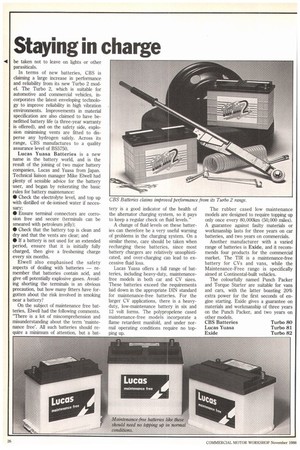Staying in charge
Page 74

If you've noticed an error in this article please click here to report it so we can fix it.
be taken not to leave on lights or other parasiticals.
In terms of new batteries, CBS is claiming a large increase in performance and reliability from its new Turbo 2 modeL The Turbo 2, which is suitable for automotive and commercial vehicles, incorporates the latest enveloping technology to improve reliability in high vibration environments. Improvements in material specification are also claimed to have benefitted battery life (a three-year warranty is offered), and on the safety side, explosion minimising vents are fitted to disperse any hydrogen safely. Across its range, CBS manufactures to a quality assurance level of BS5750.
Lucas Yuasa Batteries is a new name in the battery world, and is the result of the joining of two major battery companies, Lucas and Yuasa from Japan. Technical liaison manager Mike Elwell had plenty of sensible advice for the battery • user, and began by reiterating the basic rules for battery maintenance: • Check the electrolyte level, and top up with distilled or de-ionised water if necessary; • Ensure terminal connectors are corrosion free and secure (terminals can be smeared with petroleum jelly); • Check that the battery top is clean and dry and that the vents are clear, and • If a battery is not used for an extended period, ensure that it is initially fully charged, then give a freshening charge every six months.
Elwell also emphasised the safety aspects of dealing with batteries — remember that batteries contain acid, and give off potentially explosive gases. Avoiding shorting the terminals is an obvious precaution, but how many fitters have forgotten about the risk involved in smoking near a battery?
On the subject of maintenance free batteries, Elwell had the following comments. "There is a lot of miscomprehension and misunderstanding about the term 'maintenance free'. All such batteries should require a minimum of attention, but a bat tery is a good indicator of the health of the alternator charging system, so it pays to keep a regular check on fluid levels."
A change of fluid levels on these batteries can therefore be a very useful warning of problems in the charging system. On a similar theme, care should be taken when recharging these batteries, since most battery chargers are relatively unsophisticated, and over-charging can lead to excessive fluid loss.
Lucas Yuasa offers a full range of batteries, including heavy-duty, maintenancefree models in both car and CV sizes. These batteries exceed the requirements laid down in the appropriate DIN standard for maintenance-free batteries. For the larger CV applications, there is a heavyduty, low-maintenance battery in six and 12 volt forms. The polypropelene cased maintenance-free models incorporate a flame retardent manifold, and under normal operating conditions require no topping up. The rubber cased low maintenance models are designed to require topping up only once every 80,000km (50,000 miles). A guarantee against faulty materials or workmanship lasts for three years on car batteries, and two years on commercials.
Another manufacturer with a varied range of batteries is Exide, and it recommends four products for the commercial market. The TIR is a maintenance-free battery for CVs and vans, while the Maintenance-Free range is specifically aimed at Continental-built vehicles.
The colourfully named Punch Packer and Torque Starter are suitable for vans and cars, with the latter boasting 20% extra power for the first seconds of engine starting. Exide gives a guarantee on materials and workmanship of three years on the Punch Packer, and two years on other models.
CBS Batteries Turbo 80 Lucas Yuasa Turbo 81 Exide Turbo 82














































































